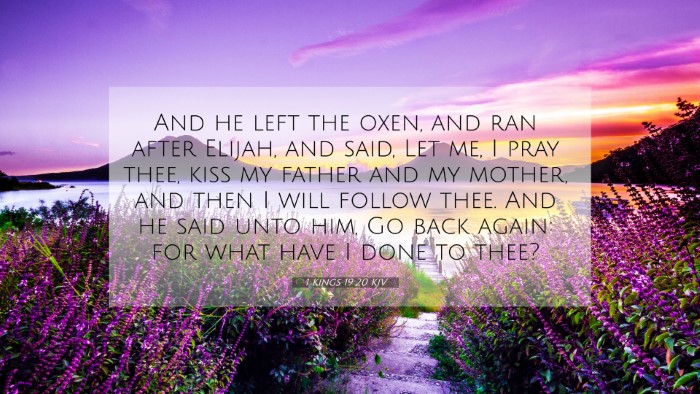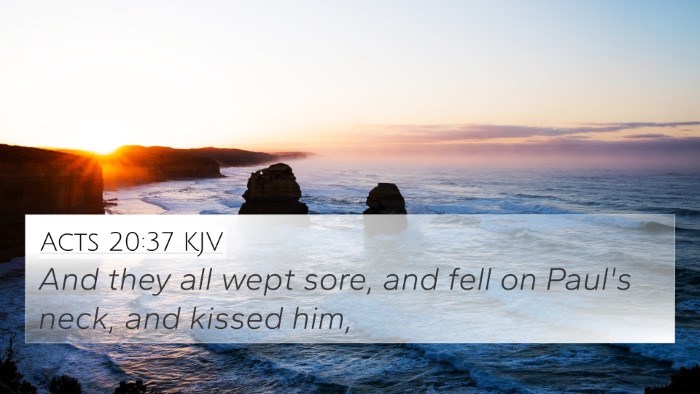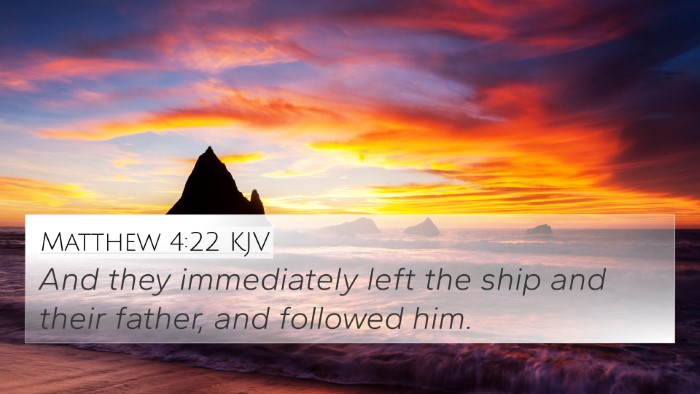Old Testament
Genesis Exodus Leviticus Numbers Deuteronomy Joshua Judges Ruth 1 Samuel 2 Samuel 1 Kings 2 Kings 1 Chronicles 2 Chronicles Ezra Nehemiah Esther Job Psalms Proverbs Ecclesiastes Song of Solomon Isaiah Jeremiah Lamentations Ezekiel Daniel Hosea Joel Amos Obadiah Jonah Micah Nahum Habakkuk Zephaniah Haggai Zechariah Malachi1 Kings 19:20 Similar Verses
1 Kings 19:20 Cross References
And he left the oxen, and ran after Elijah, and said, Let me, I pray thee, kiss my father and my mother, and then I will follow thee. And he said unto him, Go back again: for what have I done to thee?
Uncover the Rich Themes and Topics of This Bible Verse
Listed below are the Bible themes associated with 1 Kings 19:20. We invite you to explore each theme to gain deeper insights into the Scriptures.
1 Kings 19:20 Cross Reference Verses
This section features a detailed cross-reference designed to enrich your understanding of the Scriptures. Below, you will find carefully selected verses that echo the themes and teachings related to 1 Kings 19:20 KJV. Click on any image to explore detailed analyses of related Bible verses and uncover deeper theological insights.

Matthew 8:21 (KJV) »
And another of his disciples said unto him, Lord, suffer me first to go and bury my father.

Luke 9:61 (KJV) »
And another also said, Lord, I will follow thee; but let me first go bid them farewell, which are at home at my house.
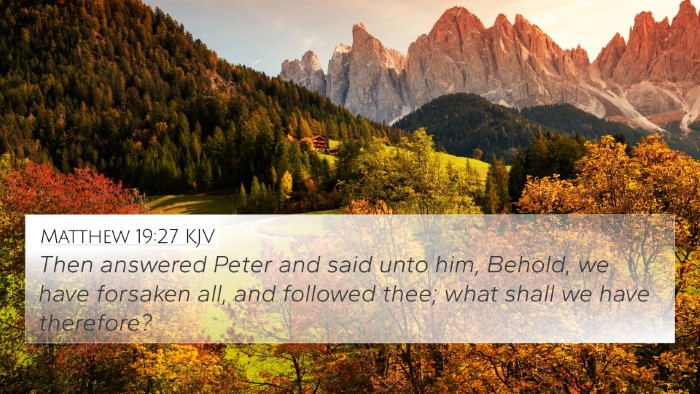
Matthew 19:27 (KJV) »
Then answered Peter and said unto him, Behold, we have forsaken all, and followed thee; what shall we have therefore?
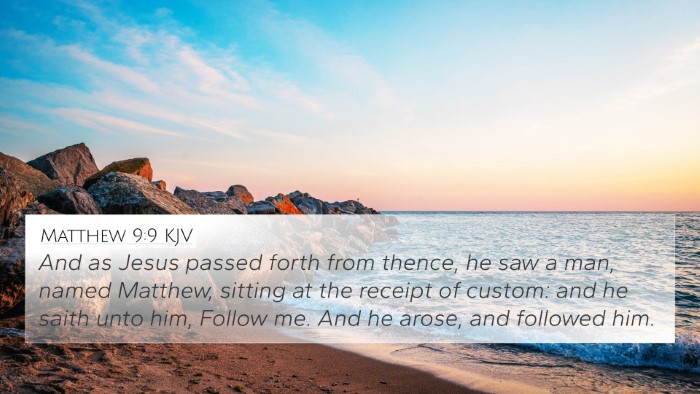
Matthew 9:9 (KJV) »
And as Jesus passed forth from thence, he saw a man, named Matthew, sitting at the receipt of custom: and he saith unto him, Follow me. And he arose, and followed him.
1 Kings 19:20 Verse Analysis and Similar Verses
Understanding 1 Kings 19:20
Bible Verse: 1 Kings 19:20 - "And he left the oxen, and ran after Elijah, and said, Let me, I pray thee, kiss my father and my mother, and then I will follow thee. And Elijah said unto him, Go back again: for what have I done to thee?”
Summary of the Verse
This verse captures a critical moment in the calling of Elisha to serve as a prophet alongside Elijah. Elisha demonstrates his commitment to respond to God’s calling by asking for time to bid farewell to his parents. Elijah’s reply indicates the weight of the prophetic call and the need for readiness in following God’s direction.
Insights from Commentaries
- Matthew Henry: Henry emphasizes the profoundness of Elisha's decision to follow Elijah. He interprets Elisha's request to kiss his parents as a sign of respect and an acknowledgment of familial duties. However, Henry points out that the call of God surpasses even these obligations, and Elisha's immediate departure illustrates the urgency of God’s work.
- Albert Barnes: Barnes highlights the significance of the phrase “What have I done to thee?” as a rhetorical response from Elijah. It suggests a divine efficiency in the calling; once God calls, the decision to follow must be made without delay. Barnes notes the importance of making a decisive choice to follow God’s direction in our lives.
- Adam Clarke: Clarke elaborates on the practical implications of Elisha's commitment. He reflects on the symbolic gesture of slaughtering the oxen, indicating a complete severance from his previous life. Clarke interprets this as a necessary step for Elisha to fully engage in his prophetic ministry, suggesting that distractions must be eliminated when pursuing one’s divine calling.
Bible Cross-References
To gain a deeper understanding of 1 Kings 19:20, we can cross-reference it with the following Bible verses:
- Luke 9:61-62: Similar call to follow Jesus without hesitation.
- Matthew 4:19-20: The calling of Peter and Andrew illustrates immediate response to divine calling.
- Exodus 3:10: God commands Moses to lead His people, showing the weight of a divine task.
- Mark 10:29-30: Jesus discusses the sacrifices made when one follows Him.
- Acts 20:24: Paul demonstrates commitment to his mission, indicative of the dedication required in following God.
- 1 Samuel 3:8-10: God calls Samuel, similar to the relational dynamic seen with Elijah and Elisha.
- 2 Kings 2:1-2: Provides context for the transition of prophetic ministry from Elijah to Elisha.
Thematic Connections
The verse presents a central theme in the Bible: the call of God often requires immediate action and a willingness to forsake former ties. Elisha’s response is a model of faith that resonates with various biblical narratives where characters similarly prioritize divine calling over familial and societal expectations.
Comparative Bible Verse Analysis
By examining cross-references, readers can identify patterns of divine calling throughout Scripture. The connections between Old and New Testament accounts reveal that the expectation of following God’s call persists across generations. For instance, both Moses and the disciples exhibit a critical moment of response that defines their ministries and impacts future generations.
Practical Application
The story of Elisha teaches modern believers about the importance of prioritizing God’s call in their lives. In a world with countless distractions, understanding and responding to God's purpose require commitment akin to what Elisha exhibited. This commitment not only transforms individual lives but also has far-reaching implications for community and faith as a whole.
Tools for Bible Cross-Referencing
For those looking to delve deeper into cross-referencing, various tools can aid in this study:
- Bible concordances can help locate related scriptures.
- Cross-reference Bible study guides offer structured pathways to navigate connections.
- Online Bible reference resources expand opportunities for comparative analysis.
Conclusion
1 Kings 19:20 serves as a powerful reminder of the call to follow God unabated by worldly concerns. Through cross-referencing biblical texts, believers can enrich their understanding of both the prophetic ministry of Elisha and the broader themes of divine calling found throughout Scripture.
